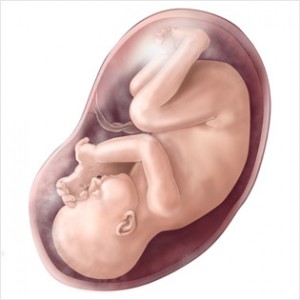What causes a woman to begin the process of laboring so strongly she can actually bring a baby into this world? The medical profession has a number of theories, none of which is scientifically conclusive, but all of them offer the same bottom line answer: no one knows.
Obstetric nurses will tell you women go into labor when there’s a full moon or a change in barometric pressure. Others might say it’s electrical storms, tornadoes, or hurricanes. A few insist labor begins when stars and planets align in a certain way.
But what do you do if everything within you longs to go into labor but you don’t? Self-help web sites offer all kinds of “natural” suggestions from castor oil to spicy foods to acupuncture, but results are mixed.
My favorite theory is the one that says labor is initiated by the baby herself. Science is speculating that maybe her adrenal gland releases cortisone, causing the placenta to convert estrogen to progesterone, which then produces prostiglandins, which cause the uterus to begin contracting.
If this theory is the correct one, it’s no wonder doctors can’t predict when labor will start. But even if that daisy chain of hormonal events is what triggers it, the baby probably can’t willfully signal her own adrenal gland to start the action. So, what or who does?
Of course it’s God.
I firmly believe he is present with his breath of life at every conception, and once a created being “gets started,” Scripture says it’s Jesus who holds it all together. Because of that, it seems logical the Trinity would be present and involved in the labor directive, “Now’s the time.”
Of course doctors can insist a birth take place by administering drugs, but often the woman’s body (and the baby) resist being rushed, making that known by increasing a mother’s suffering and pain through the labor process.
Contractions and their statistics (length and spacing) have been the conversational theme at our house since yesterday when we were sent home from the hospital with instructions not to return until pains were closer. So Birgitta had a 2nd night of misery, to which Louisa and I said, “Oh, that’s wonderful!” referring to her progress.
But the new day brought a new wrinkle: Labor stopped. Then hours later, it resumed. Then later stopped. And as I’m writing this, it has once again resumed.
Anticipation builds as Birgitta goes into her 3rd miserable night, and a verse from Ecclesiastes is looping in my brain: “God has made everything beautiful in its time.” (v. 11)
And it just isn’t time.


